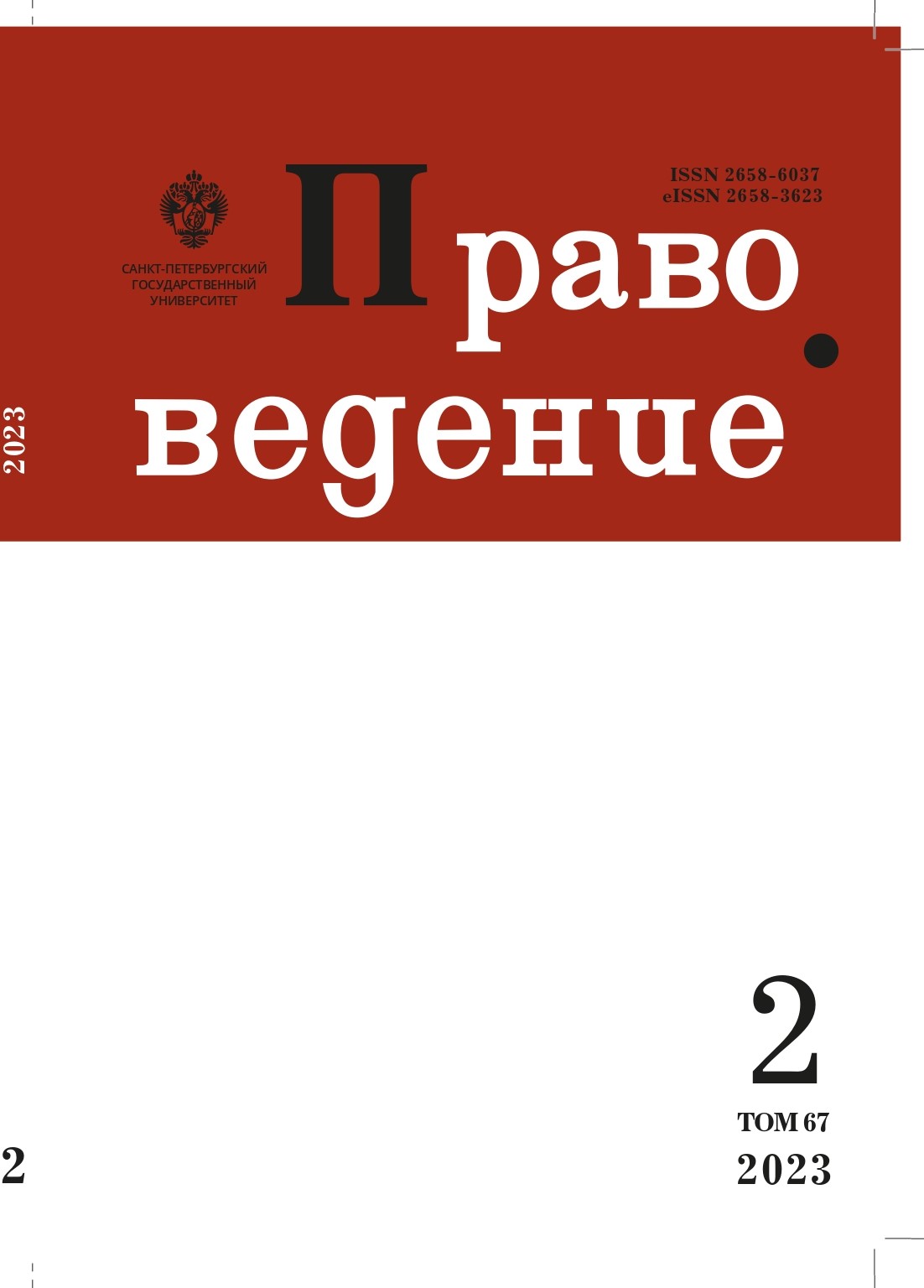The element of fault in Roman private law
DOI:
https://doi.org/10.21638/spbu25.2023.205Abstract
R. von Jhering’s 1867 work Das Schuldmoment im römischen Privatrecht, translated hereby into Russian, is still recommended in basic textbooks on German civil law marked “grundlegend”, which means “fundamental”. And indeed, despite the significant complication of the legal material on this issue since its publication, the work contains fundamental ideas from which one can depart in various directions, but which it is absolutely impossible and unacceptable for an educated lawyer to pass by. From a didactic point of view, the work is remarkable in terms of the accessibility of the language, the clarity of ideas and the illustrative nature of the material supporting them. The work of R. von Jhering, despite its relative brevity, is a full-fledged study and, undoubtedly, is one of the outstanding monuments of legal scholarship not only of the 19th century and Germany alone, but of all time for the whole world. It shows the path that the legal system must overcome from the unsophisticated ancient legal forms to an impartial assessment of what causes the greatest irritation in any person — the wrong committed against him. What is fundamentally important in the work is not that R. von Jhering explained what was already known, but how this work can help not to lose such important ethical values as the principle of guilt, proportionality of punishment, individual assessment of behavior on the further path of development. And much more. It seems that many readers, after reading the work, realize that their ideas about civil liability are much closer to Ihering’s description of ancient law, since the guilt component often goes far into the background compared to the idea that the injured person should be restored in property terms.
Keywords:
fault, private liability, damages, tort, punishment
Downloads
References
Aulus, Gellius. 2007. Noctes atticae. Moscow, Gumanitarmaya Akademia Publ. (In Russian)
von Bar, Ludwig. 1866. Das Beweiskraft des germanischen Prozesses. Hannover, Hahn’sche Hofbuchhandlung.
von Bethmann-Hollweg, Moritz A. 1965. Der Civilprozess des gemeinen Rechts in geschichtlicher Entwicklung. Bd. II. Der römische Civilprozess. Bonn, bei Adolf Marcus.
Bruns, Georg. 1861. Das constitutum debiti. Zeitschrift für Rechtsgeschichte 1: 28–130.
Cicero. 1975. On old age. On friendship. On duties. Moscow, Nauka Publ. (In Russian)
Cicero. 1991. Speeches in two volumes. Moscow, Nauka Publ. (In Russian)
CIcero. 1994. Esthetics: Treatises. Speeches. Letters. Moscow, Iskusstvo Publ. (In Russian)
Dirksen, Heinrich E. 1820. Civilistische Abhandlungen. Bd. I. Berlin, bei G. Reimer.
Goldschmidt, [Dr.]. 1856. Von der Verpflichtung der Unmündigen. Archiv für civilistische Praxis 39: 417–459.
Hasse, Johann C. 1838. Die Culpa des römischen Rechts. 2. Aufl. Bonn, bei Adolf Marcus.
Hegel, Georg W. F. 1990. The Philosophy of Law. Moscow, Mysl’ Publ.
Hepp, Carl F. Th. 1838. Die Zurechnung auf dem Gebiet des Civilrechts. Tübingen, bei C. F. Osiander.
Jhering, Rudolf. 1861. Culpa in contrahendo, oder Schadenersatz bei nichtigen oder nicht zur Perfektion gelangten Verträgen. Jahrbücher für Dogmatik des heutigen römischen und deutschen Privatrechts 4: 1–112.
Jhering, Rudolf. 1865. Geist des römischen Rechts auf den verschiedenen Stufen seiner Entwicklung. 3. Teil. Bd. III. Leipzig, Breitkopf und Härtel.
Jhering, Rudolf. 1866. Geist des römischen Rechts auf den verschiedenen Stufen seiner Entwicklung. 2. Aufl. Leipzig, Breitkopf und Härtel.
Ihering, Rudolf. 2006. Selected works. Vol. 2. St. Petersburg. (In Russian)
Ihering, Rudolf. 1867. Der Lucca-Pistoja-Eisenbahnstreit. Archiv für practische Rechtswissenschaft 4: 225–344.
Ihering, Rudolf. 2013. Culpa in contrahendo, or Damages in case of voidness or imperfection of the contact. Vestmik grazhdanskogo prava 13 (3): 190–266. (In Russian)
Köstlin, Christian R. 1838. Die Lehre vom Morde und Totschlag. Stuttgart, Verlag der J. B. Metzler’schen Buchhandlung.
Köstlin, Christian R. 1855. System des deutschen Strafrechts. Bd. I. Tübingen, H. Laupp’schen Buchhandlung.
Lehmann, Gustav. 1865. Der Notstand des Schädensprozesses und der Entwurf der Königlichen Sächsischen Civilprozeβordnung. Leipzig, Breitkopf und Härtel.
Luden, Heinrich. 1840. Abhandlungen aus dem gemeinen deutschen Strafrecht. Bd. 1. Göttingen, Vandenhöck und Ruprecht.
Merkel, Adolf. 1867. Criminalistischen Abhandlungen. Heft 1. Leipzig, Breitkopf und Härtel.
Mommsen, Friedrich. 1855. Beiträge zum Obligationenrecht. 3. Abteilung: Die Lehre von der Mora nebst Beiträgen zur Lehre von der Culpa. Braunschweig, C. A. Schwetschke und Sohn.
Neuner, Carl. 1866. Wesen und Arten der Privatrechtsverhältnisse. Kiel, Schwers’sche Buchhandlung.
Platnerus, Eduardus. 1842. Quaestiones de jure criminum Romano praesertim de criminibus extraordinariis. Marburgi et Lipsiae, Sumptibus N. G. Elwerti Bibliopolae academici.
Rein, Wilhelm. 1844. Das Criminalrecht der Römer von Romulus bis auf Justinianus. Leipzig, Verlag von K. F. Köhler.
von Savigny, Friedrich C. 1841. System des heutigen römischen Rechts. Bd. V. Berlin, bei Veit und Comp.
von Schrader, Heinrich E. S. 1832. Justiniani Institutiones. Berolini.
Unger, Josef. 1863. System des österreichischen allgemeinen Privatrechts. Bd. II. 2. Aufl. Leipzig, Breitkopf und Härtel.
Vangerow, Karl A. 1863. Lehrbuch der Pandekten. Bd. I. 7. Aufl. Marburg und Leipzig, N. G. Elwert’sche Universitäts-Buchhandlung.
Vangerow, Karl A. 1863. Lehrbuch der Pandekten. Bd. III. 6. Aufl. Marburg und Leipzig, N. G. Elwert’sche Universitäts-Buchhandlung.
Zimmern, Sigmund. 1818. System der römischen Noxalklagen. Heidelberg, In Commission bei Mohr und Winter.
Downloads
Published
How to Cite
Issue
Section
License
Articles of "Pravovedenie" are open access distributed under the terms of the License Agreement with Saint Petersburg State University, which permits to the authors unrestricted distribution and self-archiving free of charge.




